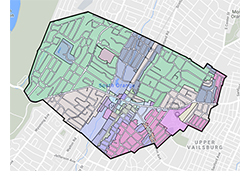
South Orange, NJ, had a business-recruitment problem. There was no shortage of tenants interested in setting up shop downtown — but the village’s rules didn’t allow for many of the types of experience-based tenants that are taking space in downtowns nationwide.
The municipality’s rules were “very, very restrictive,” says Bob Zuckerman, executive director of the South Orange Village Center Alliance. So Zuckerman embarked on a three-year project that took a comprehensive look at South Orange’s ability to recruit businesses.
Perhaps the biggest achievement was to remove barriers for businesses hoping to locate downtown.
The village’s zoning and land-use codes hadn’t been updated in decades, and were written for an era when the downtown was filled with traditional retailers.
“South Orange was viewed as a difficult place to open a business, and as a difficult place to do business,” says Zuckerman.
In one instance, a “paint and sip” business, where patrons create their own artwork while drinking wine — hoped to open a location in South Orange. But village rules prohibited such a seemingly benign tenant.
“Under our code, it was considered a place of general assembly,” Zuckerman says.
Tattoo parlors and arcades were illegal, and kids gyms were allowed only on side streets. Rather than navigate South Orange’s strict rules, business owners simply went to neighboring towns that were more welcoming.
South Orange passed new rules in mid-August, and Zuckerman says the downtown now is positioned to welcome nontraditional retail uses, rather than losing them to neighboring towns.
Details on South Orange’s four phase overhaul appear in the December issue of Downtown Idea Exchange. Click to learn more about Downtown Idea Exchange and other resources for revitalizing downtowns and commercial corridors.
